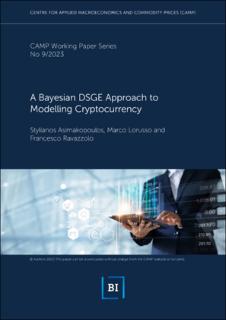| dc.contributor.author | Asimakopoulos, Stylianos | |
| dc.contributor.author | Lorusso, Marco | |
| dc.contributor.author | Ravazzolo, Francesco | |
| dc.date.accessioned | 2023-09-25T10:31:55Z | |
| dc.date.available | 2023-09-25T10:31:55Z | |
| dc.date.issued | 2023-09-21 | |
| dc.identifier.issn | 1892-2198 | |
| dc.identifier.uri | https://hdl.handle.net/11250/3091713 | |
| dc.description.abstract | We develop and estimate a DSGE model to evaluate the economic repercussions of cryptocurrency. In our model, cryptocurrency offers an alternative currency option to government currency, with endogenous supply and demand. We uncover a substitution effect between the real balances of government currency and cryptocurrency in response to technology, preferences and monetary policy shocks. We find that an increase in cryptocurrency productivity induces a rise in the relative price of government currency with respect to cryptocurrency. Since cryptocurrency and government currency are highly substitutable, the demand for the former increases whereas it drops for the latter. Our historical decomposition analysis shows that fluctuations in the cryptocurrency price are mainly driven by shocks in cryptocurrency demand, whereas changes in the real balances for government currency are mainly attributed to government currency and cryptocurrency demand shocks. | en_US |
| dc.language.iso | eng | en_US |
| dc.publisher | BI Norwegian Business School | en_US |
| dc.relation.ispartofseries | CAMP Working Paper Series;09/2023 | |
| dc.subject | DSGE Model | en_US |
| dc.subject | Government Currency | en_US |
| dc.subject | Cryptocurrency | en_US |
| dc.subject | Bayesian Estimation | en_US |
| dc.title | A Bayesian DSGE Approach to Modelling Cryptocurrency | en_US |
| dc.type | Working paper | en_US |
| dc.source.pagenumber | 98 | en_US |
